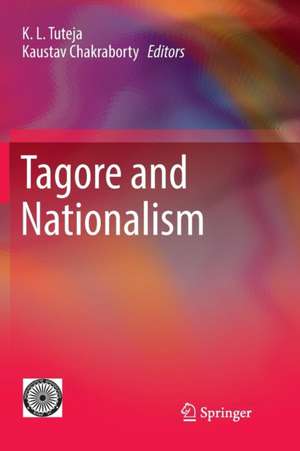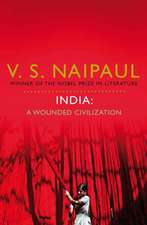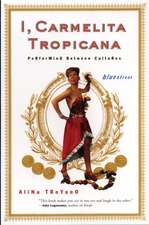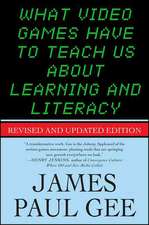Tagore and Nationalism
Editat de K. L. Tuteja, Kaustav Chakrabortyen Limba Engleză Paperback – 24 iul 2018
This volume brings together eminent Tagore scholars and younger writers to revisit the concepts of nation, nationalism, identity and selfhood, civilization, culture and homeland in Tagore’s writings. As these ideas take up the centre-stage of politics in the subcontinent as also elsewhere in the world in the 21st century, it becomes extremely relevant to revisit his works in this context.
Tagore’s ambivalence towards nationalism as an ideology was apparent in the responses in his discussions with Indians and non-Indians alike. Tagore developed the concept of ‘syncretic’ civilization as a basis of nationalist civilizational unity, where society was central, unlike the European model of state-centric civilization. However, as the subterranean tensions of communalism became clear in the early 20th century, Tagore reflexively critiqued his own political position in society. He thus emerged as the critic of the nation/nation-state and in this he shared his deep unease with other thinkers like Romain Rolland and Albert Einstein.
This volume for the first time covers the socio-political, historical, literary and cultural concerns relating to Tagore’s efforts towards the 'de-colonization' of the Self. The volume begins with various perspectives on Tagore’s ‘ambivalence’ about nationalism. It encompasses critical examinations of Tagore’s literary works and other art forms as well as adaptations of his works on film. It also reads Tagore’s nationalism in a comparative mode with contemporary thinkers in India and abroad who were engaged in similar debates.
| Toate formatele și edițiile | Preț | Express |
|---|---|---|
| Paperback (1) | 785.86 lei 6-8 săpt. | |
| Springer India – 24 iul 2018 | 785.86 lei 6-8 săpt. | |
| Hardback (1) | 792.03 lei 6-8 săpt. | |
| Springer India – 22 mar 2017 | 792.03 lei 6-8 săpt. |
Preț: 785.86 lei
Preț vechi: 958.37 lei
-18% Nou
Puncte Express: 1179
Preț estimativ în valută:
150.37€ • 157.01$ • 124.17£
150.37€ • 157.01$ • 124.17£
Carte tipărită la comandă
Livrare economică 15-29 aprilie
Preluare comenzi: 021 569.72.76
Specificații
ISBN-13: 9788132238881
ISBN-10: 8132238885
Ilustrații: XIV, 379 p.
Dimensiuni: 155 x 235 mm
Greutate: 0.55 kg
Ediția:Softcover reprint of the original 1st ed. 2017
Editura: Springer India
Colecția Springer
Locul publicării:New Delhi, India
ISBN-10: 8132238885
Ilustrații: XIV, 379 p.
Dimensiuni: 155 x 235 mm
Greutate: 0.55 kg
Ediția:Softcover reprint of the original 1st ed. 2017
Editura: Springer India
Colecția Springer
Locul publicării:New Delhi, India
Cuprins
Foreword: CHETAN SINGH.- 1. Introduction: K L TUTEJA and KAUSTAV CHAKRABORTY.- PART I: Nationalism, Ambivalence and Tagore.- 2. Rethinking Tagore on the Antinomies of Nationalism: SABYASACHI BHATTACHARYA.- 3. 1910 and the Evolution of Rabindranath Tagore’s Vernacular Nationalism: KRISHNA SEN.- 4. Language, Nationalism and Tagore: TILOTTOMA MISRA.- 5. Tagore, Nationalism and Imperialism: SUKANTA CHAUDHURI.- 6. Tagore’s Nation: Swadeshi Samaj and the Political Novel: MAKARAND R. PARANJAPE.- 7. Santiniketan, the Making of a Community: R. SIVA KUMAR.- 8. The Pathography of Nationalism: Tagore’s Critique of the Idea of the Nation: K. SATCHIDANANDAN.- 9. Rabindranath Tagore at the Intersection of Nationalism and Modernity: FAKRUL ALAM.- PART II: Nation and Textual Representations 10.History, Identity and Nation in Tagore's Fiction: SUPRIYA CHAUDHURI.- 11. The Self, the Nation and the World Beyond It: Reading Tagore’s Travel Writings: BHASKAR CHAKRABARTY.- 12.'Pollution complex', Tagore and the Tabooed Nation: Revisiting the Select Short Stories: KAUSTAV CHAKRABORTY.- 13.Tagore’s Ghaire Baire (Home and the World) and Char Adhyaya (Four Chapters): Rethinking Nationalism, Cosmopolitanism and Gender: BIRAJ MEHTA RATHI.- PART III: National Discourse under the Comparative Lens 14. Tagore's Nationalism and Premchand's: HARISH TRIVEDI.- 15. Language, Nation, Freedom: Rabindranath Tagore and Ludwig Wittgenstein on the Epistemology of Education: RUKMINI BHAYA NAIR.- 16. The Spirit of India: An Exploration of Rabindranath Tagore and Mahatma Gandhi’s ideas on Nationalism: BASHABI FRASER.- 17. Rabindranath Tagore’s Use of Guru Gobind Singh as a Nationalist Icon: CHHANDA CHATTERJEE.- 18. Nation and Civil Society as Spheres of “Enlightenment”: The Dialogue of Gandhi and Tagore, and Ambedkarite Inflection: SUKUMAR MURALIDHARAN.- 19. Ideas on Nationalism in Tagore and Unamuno: A Comparative Study: SWAGATA KUMAR BASU.- 20. Tagore and Nationalism: A Perspective on Italy Imagining the Indian Unity: STEFANO BEGGIORA.- PART IV: Interrogating Nationalism in Art and Culture 21. From Rabindranath Tagore to Rituporno Ghosh: Domestic space, Gender and the Nation in Chokher Bali: PATHIK ROY.- 22. Nation and Partition: Tagore Reinvented by Ritwik Ghatak: MANAS GHOSH.- 23.The Useless and the ‘Wonderful’: Work, Leisure and Being ‘at Home in Modernity’ in the Music of Rabindranath Tagore: SAURAV DASTHAKUR.- 24.Dancing against the Nation? Politics versus Performance in Tagore’s Politics of Performance: AISHIKA CHAKRABORTY
Notă biografică
K.L. Tuteja, PhD, is Former Professor of Modern Indian History at Kurukshetra University, Kurukshetra and currently, Tagore Fellow at the Indian Institute of Advanced Study, Shimla.
Textul de pe ultima copertă
This volume brings together eminent Tagore scholars and younger writers to revisit the concepts of nation, nationalism, identity and selfhood, civilization, culture and homeland in Tagore’s writings. As these ideas take up the centre-stage of politics in the subcontinent as also elsewhere in the world in the 21st century, it becomes extremely relevant to revisit his works in this context.
Tagore’s ambivalence towards nationalism as an ideology was apparent in the responses in his discussions with Indians and non-Indians alike. Tagore developed the concept of ‘syncretic’ civilization as a basis of nationalist civilizational unity, where society was central, unlike the European model of state-centric civilization. However, as the subterranean tensions of communalism became clear in the early 20th century, Tagore reflexively critiqued his own political position in society. He thus emerged as the critic of the nation/nation-state and in this he shared his deep unease with other thinkers like Romain Rolland and Albert Einstein.
This volume for the first time covers the socio-political, historical, literary and cultural concerns relating to Tagore’s efforts towards the 'de-colonization' of the Self. The volume begins with various perspectives on Tagore’s ‘ambivalence’ about nationalism. It encompasses critical examinations of Tagore’s literary works and other art forms as well as adaptations of his works on film. It also reads Tagore’s nationalism in a comparative mode with contemporary thinkers in India and abroad who were engaged in similar debates.
Caracteristici
First book to discuss specifically Tagore’s works and perspectives on nationalism, and to engage with the present-day controversies regarding the national question
Covers theoretical concerns, representations as well as comparative study on Tagore’s notion of nationalism
Includes contributions by some of the foremost Tagore scholars
Includes supplementary material: sn.pub/extras
Covers theoretical concerns, representations as well as comparative study on Tagore’s notion of nationalism
Includes contributions by some of the foremost Tagore scholars
Includes supplementary material: sn.pub/extras














